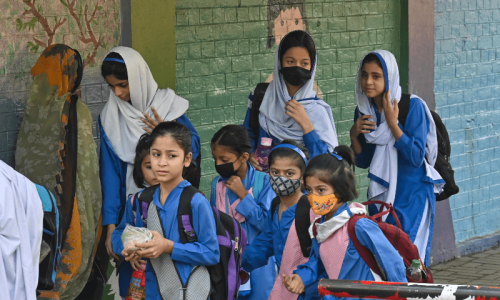• Educational institutions closed till Sept 12
• Indoor/outdoor gatherings, gyms banned
• Intercity public transport prohibited
• Islamabad, Rawalpindi, Lahore, Multan, Peshawar among areas hit by restrictions
• Turkey eases quarantine regulations for Pakistanis
ISLAMABAD: More restrictions have been placed on 24 districts of the country as the government continues to take measures to stem the spread of Covid-19.
The National Command and Operation Centre (NCOC) on Friday decided to impose additional non-pharmaceutical interventions (NPIs) in 24 districts, including the capital Islamabad, for nine days, with effect from today (Saturday). The curbs will remain effective till Sept 12.
The forum will review the non-pharmaceutical interventions on Sept 9.
On the other hand, the country reported 57 casualties and over 3,700 new cases in a single day.
Minister for Planning, Development and Special Initiatives Asad Umar, who also heads the NCOC, briefed Prime Minister Imran Khan on the prevailing situation of the virus in the country and informed him about the steps taken by the forum. Mr Khan favoured stricter restrictions in cities where the deadly virus had seen a significant spread.
“Covid update encompassing special NPIs for selective high disease prevalence districts of Punjab, KP and ICT were presented by NCOC to Prime Minister Imran Khan on Friday,” said the forum’s handout issued on Friday.
After taking a detailed stock of the situation in various districts, including daily hospital admissions, pressure on critical care and availability of oxygen, the prime minister approved implementation of special NPIs in 24 high disease-prevalence districts, it added.
Under the new standard operating procedures (SOPs), the education sector will be closed and all types of indoor and outdoor gatherings, indoor gyms and intercity public transport will be prohibited.
The districts where the new restrictions will come into effect are Rawalpindi, Lahore, Gujrat, Gujranwala, Sialkot, Sheikhupura, Faisalabad, Sargodha, Khushab, Mianwali, Rahim Yar Khan, Khanewal, Bhakkar, Multan and Bahawalpur in Punjab, Haripur, Malakand, Mansehra, Swabi, Dera Ismail Khan, Swat, Abbottabad and Peshawar in Khyber Pakhtunkhwa as well as Islamabad.
The NCOC said special NPIs would remain in force from Sept 4 till 12 in all the 24 districts while those for the remaining sectors would continue as had been communicated by the authorities.
All federating units have been requested to devise a robust mechanism to implement the special NPIs.
A few days ago, Asad Umar had warned that the number of hospital inflows and patients in critical care was at the “highest level” since the outbreak of the Covid-19 pandemic in the country.
The Delta strain’s impact showed that the variant spreads at a faster rate and enhances chances of hospitalisation among patients, the minister said.
Meanwhile, 57 people lost their battle against coronavirus and another 3,787 patients surfaced in the last 24 hours, recording a positivity ratio of 6.33 per cent.
The NCOC data revealed that the total number of deaths from Covid-19 in Pakistan had surpassed 26,000.
According to the government’s portal that tracks the spread of the disease, 6,595 recoveries were recorded in the last 24 hours.
So far, the country has witnessed a total of 1,055,467 recoveries, posting a recovery ratio of 90.1pc.
Meanwhile, Turkey has further eased quarantine regulations for Pakistani nationals.
“ - No quarantine for vaccinated persons
- Quarantine at the given addresses for residents and students, at booked hotels for tourists,” the Pakistani embassy in Turkey tweeted.
It may be mentioned that the government had put in place a number of restrictions on unvaccinated people from Sept 1 to check the transmission of the virus.
Among them was preventing unvaccinated transporters from picking and dropping students.
Similarly, partially inoculated people could enter and work in shopping malls but they would have to be fully vaccinated by Sept 30.
National Health Services (NHS) ministry spokesperson Sajid Shah had said air travel curbs had been in place since August, but people who were at least partially vaccinated could undertake domestic air travel.
“However, after Sept 30, only fully vaccinated people would be allowed domestic and international air travel, and this restriction would be for both inbound and outbound travelers,” the spokesperson had said.
Likewise, travel on trains and buses and use of highways and motorways would be subject to complete vaccination by Oct 15.
Mr Shah had also announced that booster shots would be available to those planning to travel abroad.
“But since a booster dose was a travel requirement and not a health-related necessity, Rs1,270 would be charged for each dose,” he added.
In a statement, the NCOC had also announced revision in its vaccination guidelines for people below 18 years of age.
“The general public age group for vaccination has been lowered to 17 years,” the forum had said, adding that Pfizer vaccine will be administered to those below 18 years.
The statement said immune-compromised individuals between 12 and 17 years of age would also be vaccinated with the Pfizer vaccine.
Published in Dawn, September 4th, 2021













































Dear visitor, the comments section is undergoing an overhaul and will return soon.